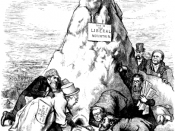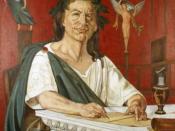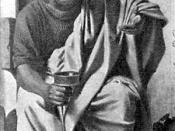The Classical period is considered to be the beginning of literary theories. The main figures in this era were Plato (428/7 -348/7 BC) the father of Philosophy, followed by his student Aristotle (384-322 BC) who is considered to be the father of most of sciences. All other critics who came after Plato and Aristotle were influenced by their theories, whether agreed or disagreed but they took their theories as a base then they built their new ideas. However, Aristotle's influence was greater than Plato's, since Plato with his holistic view of the world was dealing with the ideal and perfect world. Whereas Aristotle was concerned with the real world and the universal truth. His Poetics, was the first systematic essay in criticism in which Aristotle was concerned in Drama and Tragedy in particular, he tried to clarify the rules that were followed in producing a work of art, after he observed all forms of art that were produced in his time.
The Poetics "Like many of Aristotle's other attempts to systematize knowledge about an area, this work has had a strong influence up to present day and was particularly influential during the Renaissance era and the early modern European periods"(Anonymous, Aristotle 1). Many of Aristotle's rules and ideas were adopted, but in the Renaissance era they focused on the need for a work to be unified, which Aristotle stresses in his Poetics. The Plot, the subject matter, the action, the time of action, the style and the character should all be unified. These unities were developed and added to by the Renaissance writers to produce the rules of Decorum for dramatic productions. According to them, failure to observe the rules of Decorum in the work, was often regarded as failure of the work itself.
Although the notion of Decorum in...


